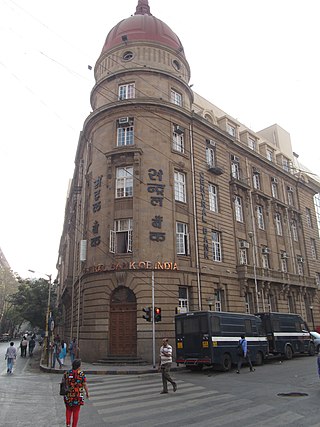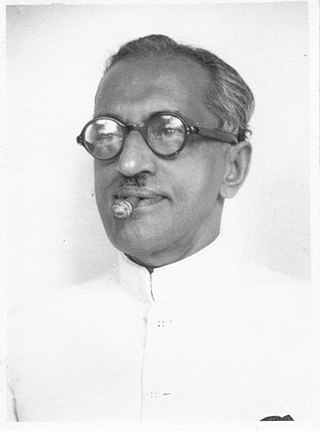
The Reserve Bank of India, abbreviated as RBI, is India's central bank and regulatory body responsible for regulation of the Indian banking system. It is under the ownership of Ministry of Finance, Government of India. It is responsible for the control, issue and maintaining supply of the Indian rupee. It also manages the country's main payment systems and works to promote its economic development. Bharatiya Reserve Bank Note Mudran (BRBNM) is a specialised division of RBI through which it prints and mints Indian currency notes (INR) in four of its currency printing presses located in Nashik, Dewas, Mysore and Salboni. The RBI established the National Payments Corporation of India as one of its specialised division to regulate the payment and settlement systems in India. Deposit Insurance and Credit Guarantee Corporation was established by RBI as one of its specialised division for the purpose of providing insurance of deposits and guaranteeing of credit facilities to all Indian banks.

State Bank of India (SBI) is an Indian multinational public sector bank and financial services statutory body headquartered in Mumbai, Maharashtra. SBI is the 48th largest bank in the world by total assets and ranked 221st in the Fortune Global 500 list of the world's biggest corporations of 2020, being the only Indian bank on the list. It is a public sector bank and the largest bank in India with a 23% market share by assets and a 25% share of the total loan and deposits market. It is also the fifth largest employer in India with nearly 250,000 employees. On 14 September 2022, State Bank of India became the third lender and seventh Indian company to cross the ₹ 5-trillion market capitalisation on the Indian stock exchanges for the first time.
The term national bank generally refers to a bank that operates across and within a nation state or country, but its usage varies by country. In some cases it operates as the government's reserve bank, while in others the name is used for commercial banks.

Bank of India (BOI) is an Indian public sector bank headquartered in Bandra Kurla Complex, Mumbai. Founded in 1906, it has been government-owned since nationalisation in 1969. BoI is a founder member of SWIFT, which facilitates provision of cost-effective financial processing and communication services.

Kollam, also known by its former name Quilonpronunciation (help·info), is an ancient seaport and city on the Malabar Coast of India bordering the Laccadive Sea, which is a part of the Arabian Sea. It is 71 km (44 mi) north of the state capital Thiruvananthapuram. The city is on the banks of Ashtamudi Lake and the Kallada river. Kollam is the fourth largest city in Kerala and is known for cashew processing and coir manufacturing. It is the southern gateway to the Backwaters of Kerala and is a prominent tourist destination. Kollam is one of the most historic cities with continuous settlements in India. The Malayalam calendar (Kollavarsham) is also known so with the name of the city Kollam. Geographically, Quilon formation seen around coastal cliffs of Ashtamudi Lake, represent sediments laid down in the Kerala basin that existed during Mio-Pliocene times.

State Bank of Hyderabad (SBH) was a regional bank in Hyderabad, with headquarters at Gunfoundry, Abids, Hyderabad, Telangana. Founded by the 7th Nizam of Hyderabad State, Mir Osman Ali Khan, it is now one of the five associate banks of State Bank of India (SBI) and was one of the nationalized banks in India. It was founded in 1941 as the Hyderabad State Bank. From 1956 until 31 March 2017, it had been an associate bank of the SBI, the largest such. The State Bank of Hyderabad was merged with SBI on 1 April 2017.
State Bank of Travancore (SBT) was a major Indian bank headquartered in Thiruvananthapuram, Kerala, and was a major associate of State Bank of India.
Modern banking in India originated in the mid of 18th century. Among the first banks were the Bank of Hindustan, which was established in 1770 and liquidated in 1829–32; and the General Bank of India, established in 1786 but failed in 1791.

Central Bank of India (CBI) is an Indian public sector bank based in Mumbai. Despite its name, it is not the central bank of India; The Indian central bank is the Reserve Bank of India.

Federal Bank Limited is an Indian private sector bank headquartered in Aluva,Kochi, Kerala. The bank has 1,370 branches spread across different states in India. It also has representative offices abroad in Abu Dhabi, Qatar, Kuwait, Oman, and Dubai.
HDFC Bank Limited is an Indian banking and financial services company headquartered in Mumbai. It is India's largest private sector bank by assets and world's fourth largest bank by market capitalisation as of July 2023, following its takeover of parent company HDFC. It is the second largest company by market capitalisation of $172 billion on the Indian stock exchanges. It is also the sixteenth largest employer in India with nearly 1.78 lakh employees.
Palai Central Bank was a commercial bank headquartered in Kerala, South India that functioned during the middle of last century. Although it was started in a small, remote city, the bank grew to become not only the largest bank but the latest institution in Kerala, after the state government, and the 17th largest among the 94 scheduled banks in India. The Kerala High Court in 1960 ordered the liquidation of Palai Central Bank on a petition from the Reserve Bank of India.
Axis Bank Limited, formerly known as UTI Bank (1993–2007), is an Indian banking and financial services company headquartered in Mumbai, Maharashtra. It is India's third largest private sector bank by assets and Fourth largest by Market capitalisation.It sells financial services to large and mid-size companies, SMEs and retail businesses.

Yes Bank is an Indian bank headquartered in Mumbai, India and was founded by Rana Kapoor and Ashok Kapoor in 2004.
Banking was one of the most preferred lines of business in the princely states of Travancore and Cochin, and the Malabar Province of British India — the area that later became the state of Kerala — during the twentieth century. A list of some of the banks that operated in the region during the twentieth century are given below. Due to various reasons, most of them were either closed or amalgamated with other banks, leaving only a handful now.

Chalakuzhy Paulose Mathen was an Indian politician who served as a member of the Indian Parliament in the first Lok Sabha, constituted in 1952 after India gained independence from the United Kingdom. He represented the Thiruvalla constituency of Kerala. Mathen was appointed the Indian Ambassador to Sudan after his single term in the Lok Sabha.

The Nainital Bank Limited (NTB) is a scheduled commercial bank founded in 1922. The bank is a subsidiary of Bank of Baroda which is under the ownership of Ministry of Finance of the Government of India. The bank has expanded to Uttar Pradesh and Uttarakhand, and has only 170 branches in Rajasthan, Delhi and Haryana.

ESAF Small Finance Bank is an Indian small finance bank providing banking services and small loans to the underbanked. It was founded as a small finance bank in March 2017. ESAF Microfinance started its operations as an NGO in 1992 as Evangelical Social Action Forum. Before becoming a bank, ESAF was a non-banking finance company and microfinance institution (NBFC-MFI), licensed by the Reserve Bank of India (RBI) and headquartered in Thrissur city of Kerala.
Alexander and Company, Limited, often simply called Alexander and Co., was an Agency House in British India founded by traders and merchants from Scotland. Alexander and Co. has made several pioneering contributions to the economy of India. Alexander and Co. was the promoter and founder of India's very first bank, the Bank of Hindostan.
The General Bank of Bengal and Bihar was a bank founded in the year 1773 in British India. The bank was the fourth oldest bank in India. The bank became defunct March 31st, 1775.











